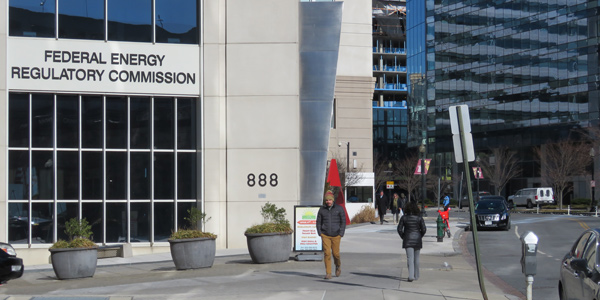FERC on Thursday defended its Competitive Auctions with Sponsored Policy Resources (CASPR) order, which permitted ISO-NE to create a two-stage capacity auction to accommodate state renewable energy procurements (ER18-619).
The commission voted 2-1 along party lines, with Republicans James Danly, newly installed as chair, and Neil Chatterjee, recently demoted from it, affirming the March 2018 order and addressing complaints in numerous rehearing requests. The rehearing requests were automatically denied when the commission failed to act within 30 days. In the meantime, the Sierra Club, Natural Resources Defense Council, RENEW Northeast and the Conservation Law Foundation petitioned the D.C. Circuit Court of Appeals on Aug. 31 to review FERC’s decision.
Filing as “Clean Energy Advocates,” the groups had said that rather than attempting the “impossible and misguided” effort to create a “pure” market free from the impacts of state policy choices, FERC should reject CASPR as not just and reasonable.
FERC said it continued “to find the economic principles underlying CASPR to be sound” and agreed with the RTO’s recommendation to prioritize the preservation of a competitive Forward Capacity Auction price to ensure investor confidence. That helps sustain resource adequacy, the commission said, after weighing the cost of excess capacity that could result by exempting sponsored-policy resources (SPRs) from the minimum offer price rule (MOPR).
The commission also reiterated that ISO-NE did not propose eliminating the MOPR as applied to SPRs.
FERC also rejected the groups’ request that it at least reinstate the 200-MW renewable technology resource (RTR) exemption.
“ISO-NE has justified phasing out the renewables exemption because this administratively based mechanism conflicts with and potentially undermines CASPR’s market-based approach,” the commission said. “Implementing a perpetual, annual 200-MW ‘backstop’ would exacerbate this situation, as renewable resources would tend to favor the exemption approach to entering the FCM [Forward Capacity Market], potentially diminishing a well functioning and robust substitution auction.”
Glick Dissents
Democrat Richard Glick dissented, as he had on the 2018 order. (See Split FERC Approves ISO-NE CASPR Plan.)
Glick — who may become commission chair under the Biden administration — said he does not believe that CASPR “is a just and reasonable means of accommodating state public policies” in the FCM.
“The record demonstrates that CASPR is failing miserably at accommodating those policies,” he said during the monthly open meeting.
“Although CASPR had some theoretical appeal, the nearly three years since the commission accepted the filing have made clear that, in practice, CASPR simply is not up to the task of accommodating the New England states’ efforts to decarbonize their electricity sector and address the threat of climate change,” Glick said in his 13-page dissent. “It is time to go back to the drawing board. …
“Electricity markets are, and always have been, the product of public policy,” Glick said. “Pretending otherwise or trying to mitigate our way to a market free from the effects of certain public policies will only harm customers, create needless federal-state tensions and undermine faith in the regional markets whose development has been this commission’s crowning achievement. We must move beyond the MOPR.”
Glick added that he recognized reforming electricity markets to manage the ongoing transition to a clean energy future is a complicated question, and “the right answer will likely vary among the different RTOs.”
“But that is all the more reason to begin putting those structures in place now, rather than searching for ways to keep MOPR-based approaches on life support,” Glick said.
Glick added that he does not believe that the current FCM is working for ISO-NE.
“In New England, as in the other Eastern RTOs, it has become clear that the principles and assumptions that underlay the creation of the current capacity market constructs no longer hold,” Glick said. “In particular, the days when the procurement of a single, undifferentiated ‘capacity’ product could serve as an effective guide for efficient resource entry and exit are over.”
Glick said concerns about “consequences that resource entry and exit decisions have for climate change, among other things, are likely to play a more important role in resource entry and exit than the FCM clearing price,” especially in New England.
“It is past time for the resource adequacy paradigms to evolve accordingly,” Glick said. The longer FERC “waits to take those inevitable steps, the more harm it will do to RTO markets and the customers we are supposed to protect.”
“It will eventually require that all the relevant elements of an RTO — including not just the resource adequacy construct, but also the procurement of energy and ancillary services, as well as the planning and development of new transmission facilities — work in concert to accommodate the changing electricity sector,” Glick said. “That will be no mean feat.”




